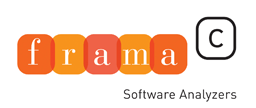Frama-C / Frama C Snapshot
Labels
Projects that are alternatives of or similar to Frama C Snapshot
Frama-C is a platform dedicated to the analysis of source code written in C.
Note: The Official Frama-C Repository is now at our Gitlab!
Frama-C has moved its official repository to our self-hosted Gitlab instance.
Official releases (starting from Frama-C 21) will no longer be updated here.
Nightly snapshots are also available in our Gitlab! You can now get access to the latest development version at: https://git.frama-c.com/pub/frama-c/-/tree/master
The official Frama-C issue tracker is now at our Gitlab: https://git.frama-c.com/pub/frama-c/-/issues
You can submit issues and pull requests using your Github login (choose "Sign in with Github" when prompted).
See you there!
A Collaborative Platform
Frama-C gathers several analysis techniques in a single collaborative platform, consisting of a kernel providing a core set of features (e.g., a normalized AST for C programs) plus a set of analyzers, called plug-ins. Plug-ins can build upon results computed by other plug-ins in the platform.
Thanks to this approach, Frama-C provides sophisticated tools, including:
- an analyzer based on abstract interpretation, aimed at verifying the absence of run-time errors (Eva);
- a program proof framework based on weakest precondition calculus (WP);
- a program slicer (Slicing);
- a tool for verification of temporal (LTL) properties (Aoraï);
- a runtime verification tool (E-ACSL);
- several tools for code base exploration and dependency analysis (From, Impact, Metrics, Occurrence, Scope, etc.).
These plug-ins share a common language and can exchange information via ACSL (ANSI/ISO C Specification Language) properties. Plug-ins can also collaborate via their APIs.
Installation
For more detailed information about installing OPAM/Frama-C, see INSTALL.md.
Frama-C is available through OPAM, the OCaml Package Manager. This is the preferred installation method. Be sure to install opam v2.0 or higher. Then the following sequence of commands should install frama-c and its gui:
opam init
opam install depext
opam depext frama-c
opam install frama-c
Frama-C is developed mainly in Linux, often tested in macOS (via Homebrew), and occasionally tested on Windows (via the Windows Subsystem for Linux).
Usage
Frama-C can be run from the command-line, or via its graphical interface.
Simple usage
The recommended usage for simple files is one of the following lines:
frama-c file.c -<plugin> [options]
frama-c-gui file.c
Where -<plugin> is one of the several Frama-C plug-ins,
e.g. -eva, or -wp, or -metrics, etc.
Plug-ins can also be run directly from the GUI.
To list all plug-ins, run:
frama-c -plugins
Each plug-in has a help command
(-<plugin>-help or -<plugin>-h) that describes its several
options.
Finally, the list of options governing the behavior of Frama-C's kernel itself is available through
frama-c -kernel-help
Complex scenarios
For more complex usage scenarios (lots of files and directories, with several preprocessing directives), we recommend splitting Frama-C's usage in two parts:
- Parsing the input files and saving the result to a file;
- Loading the parsing results and then running the analyses or the GUI.
Parsing typically involves giving extra arguments to the C preprocessor,
so the -cpp-extra-args option is often useful, as in the example below:
frama-c *.c *.h -cpp-extra-args="-D<define> -I<include>" -save parsed.sav
The results are then loaded into Frama-C for further analyses or for inspection via the GUI:
frama-c -load parsed.sav -<plugin> [options]
frama-c-gui -load parsed.sav -<plugin> [options]
Further reference
-
Links to user and developer manuals, Frama-C archives, and plug-in manuals are available at
http://frama-c.com/download.html -
StackOverflow has several questions with the
frama-ctag, which is monitored by several members of the Frama-C community. -
The Frama-c-discuss mailing list is used for announcements and general discussions.
-
The official bug tracking system can be used for bug reports.
-
The Frama-C wiki has some useful information, although it is not entirely up-to-date.
-
The Frama-C blog has several posts about new developments of Frama-C, as well as general discussions about the C language, undefined behavior, floating-point computations, etc.
-
The Github snapshot repository contains the .tar.gz archives of stable Frama-C releases, ready to be cloned. It can also be used for reporting issues and submitting pull requests.

